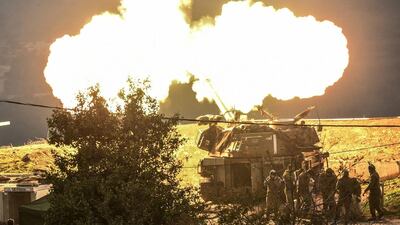BEIRUT// Israel shelled southern Lebanon on Monday afternoon after Hizbollah targeted Israeli military vehicles on the border with an improvised explosive device.
Hizbollah said “the group of the martyr Samir Kuntar” carried out the attack in the disputed Shebaa Farms area, resulting in a number of injuries.
Israeli military spokesmen confirmed the attack, saying that two vehicles were targeted with an improvised explosive device in the area of Mount Dov and that Israel responded with artillery fire. They did not mention any casualties.
Lebanese media outlets, including Hizbollah’s Al Manar TV station, reported that Israeli shells hit a number of buildings in southern Lebanon.
The Israeli artillery strikes did not provoke further clashes and the situation along the border was reportedly calm following their cessation.
The Hizbollah attack was retaliation for the December 19 assassination of Lebanese militant Samir Kuntar. Imprisoned by Israel for nearly three decades for a 1979 attack in Nahariya that killed an Israeli man and his four-year-old daughter, Kuntar was released by Israel in a 2008 swap deal with Hizbollah. Following his release, Kuntar was welcomed home as a hero by the militant group and given a position within the organisation.
Since Israeli jets killed Kuntar in an air strike on a Damascus suburb last month, Hizbollah has repeatedly vowed to avenge his death.
In late December, Hizbollah leader Hassan Nasrallah said retaliation for Kuntar’s death was inevitable and would come either inside Israel or abroad.
“Whatever are the consequences and threats – which we don’t fear – we can’t tolerate and forgive those who shed the blood of our fighters and brothers,” he said in a speech aired by Al Manar.
Last week, the Israeli Defense Forces chief of staff Gadi Eizenkot warned Hizbollah against retaliating for Kuntar’s death, saying the group would face “severe consequences” if it sought to threaten Israel’s security.
According to The Times of Israel, the IDF had been expecting Hizbollah to take advantage of low visibility caused by stormy weather in recent days to launch an attack. Looking to dissuade an attack, the military shelled the area around Israel’s border fence in recent days, the paper reported.
Monday’s attack was the first cross-border operation mounted by Hizbollah in nearly a year. On January 28 last year, Hizbollah militants fired anti-tank missiles at an Israeli military convoy in the Shebaa Farms, killing two soldiers. Israel responded with artillery fire that killed a Spanish UN peacekeeper.
That ambush was retaliation for the killing of Jihad Mughniyeh, a son of the late Hizbollah military commander Imad Mughniyeh. Like Kuntar, the younger Mughniyeh was killed by an Israeli strike in Syria.
Despite bellicose words, Hizbollah has not been seen as eager for a fight with Israel. With many of its fighters deployed to Syria to back the government of Bashar Al Assad and battling ISIL and Jabhat Al Nusra along Lebanon-Syria border, Hizbollah’s attention has largely turned away from Israel in recent years as opening a third front would be dangerous.
While the group has been engaged in Syria, Israel has struck Hizbollah and Syrian government targets there. Some of the strikes by jets and attack helicopters have hit convoys suspected to be transporting weapons to Hizbollah.
foreign.desk@thenational.ae

